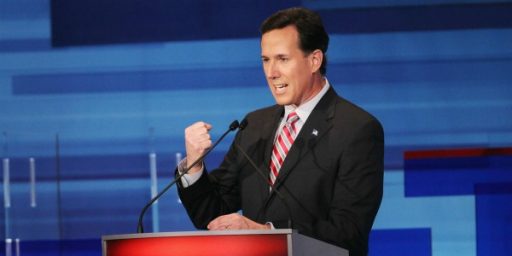The Limits of Forecasting the Impact of Policy
This one’s for you, Steve. I was searching for some information on Japan’s economic problems when I stumbled upon this snippet in an article on the global outlook at the Wharton School:
In a way, Japan is especially relevant in today’s global economic crisis because of its experience with a sharp economic decline and struggle to revive in the 1990s — often referred to Japan’s “lost decade.” Its policy makers tried a variety of fiscal and monetary stimuli that may provide clues to how today’s global economic leaders should approach the current problems.
Wharton management lecturer Adrian Tschoegl worked for six years as a macroeconomist at a Tokyo investment bank during that country’s economic rise and fall. “That’s when I realized that most forecasts of complex political and economic events are valueless,” says Tschoegl. He says he made some good calls and some bad calls when he was working in Japan, but came to believe that in today’s complex, interrelated global economic system, it is nearly impossible to predict the true impact of one policy action or another.
“We can come up with some ideas and a range of forecasts and some information about the risk of what is out there,” he says, “but the reality is that all sorts of things can come out of nowhere and suddenly hit you.”
When governments attempt to enact policies to respond to economic problems, it is hard to tell what will happen one or two steps forward as policies and market forces begin to interact, he adds.
“The problem is that very often the best thing to do is to simply not do anything,” says Tschoegl. “But no politicians can bring themselves to stand up here and say, ‘We don’t have the faintest idea of what to do,
Japan has tried everything its political leaders could think of over the period of the last 20 years to boost itself out of its economic doldrums: fiscal stimulus in the form of tax cuts, fiscal stimulus in the form of government spending, interest rates near or at zero and so on. Nothing has worked because what they haven’t tried is structural change that’s too painful to contemplate. Their banking system needs to be more transparent. Their banks need to stop making bad loans to their friends. They’ve got to accept that a lot of banks are insolvent and must be allowed to close. They’ve got to get their fiscal house in order (public debt is 180% of GDP).
I’m afraid their problems are very much like our own.






What’s really ironic is that Mr Tschoegl’s belief matches that of many laymen. In the absence of any real evidence of what will happen as a result of any given action, it’s easy to believe that one’s preferred action is the one that will solve the problem.
Which just makes me wonder if my preferred action of no action, hands off, is just my version of the above approach.
A bunch of good posts coming by today, guys. I’ll read and answer in more detail later. My quick reminder is that uncertainty does not really always imply that inaction is the best policy.
It might imply splitting the difference, which might explain a $700B as opposed to $1.5T stimulus. (Isn’t that the high side that Krugman etc. have suggested?)
Well here is one forecast I’m fairly sure of, the economy will likely be another significant portion of OTB Radio. I’ll have to make an extra effort to be on.
I wonder how much of this is cultural? And thus just how much of the Japanese experience is relevant to our own?
I don’t see the bank:fed culture breaking down too much so far.
Enjoy: Predicting Crisis: Dr. Doom & the Black Swan
“The problem is that very often the best thing to do is to simply not do anything,†says Tschoegl. “But no politicians can bring themselves to stand up here and say, ‘We don’t have the faintest idea of what to do,”
I don’t suppose we could have a do over, and vote this guy in?
Perhaps in the annals of impact forecasting, you guys could tell me where I misplaced my profitable Iraq war.
You truly have no shame.